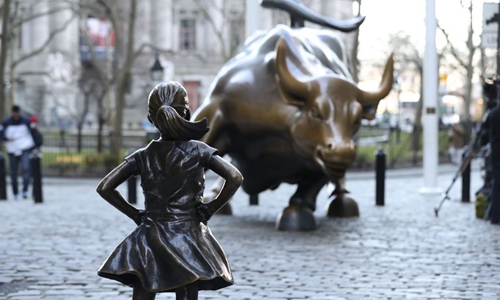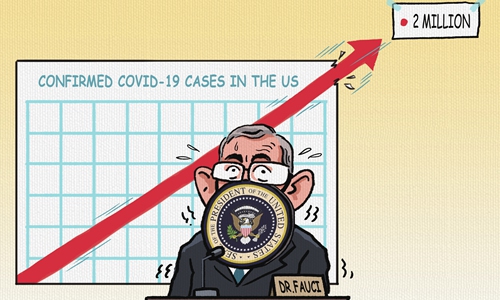US still 'king' of contemporary capitalism

The "fearless girl" statue facing the bronze bull statue near the Wall Street in New York, the United States, March 9, 2017. The "fearless girl" was put there by an investment firm to call attention to the lack of gender diversity in management of companies and the fact that they get paid less than men. (Xinhua/Wang Ying)
Many of the problems that have arisen since the beginning of the 21st century are ultimately the result of American-style capitalism - especially the social divisions in the US itself.
This raises a challenging and contemporary question: Can capitalism be sustained?
Since the financial crisis of 2008, the US and Western intellectual elites have been deepening their reconceptualization of capitalism, particularly the American-style capitalism.
For example, French economist Thomas Piketty's Capitalism in the Twenty-First Century, published in 2014, is a masterpiece. Piketty studied economic data of more than 200 years, and the results confirm that the wealth increase has grown more than GDP, meaning that money generates more money than people work hard to earn. If a state cannot seriously control capital flow through distribution, then the society will undoubtedly become more and more unequal.
Piketty is a reformist thinker who advocates increasing the fairness of social distribution by significantly raising taxes on the rich.
Other scholars argue that only a fundamental transformation of the capitalist system can stop this growing gap between the rich and the poor.
Swedish scholar Martin Hägglund, a rising theoretical star in recent years, represents this view. He argues that capitalism is motivated precisely by its "harmful wealth inequality" and that redistribution is not the real solution.
It means that petty reforms cannot save capitalism, and that the capitalist system cannot be the solution as long as the wealth generated by capitalism is the root of the problem.
Similar discussions have emerged in recent years. But recent talks about capitalism have had a widespread impact on US' well-educated younger generations - millennials and Generation Z - who understand these theories and studies in terms of their predicaments. These include being burdened with large education loans, not earning enough to pay rent, not being able to find more suitable employment, and the inability to find more suitable employment opportunities.
In this social context, some American politicians began to refocus on the "middle way" of democratic socialism represented by Sweden. They seek a path to transform American capitalism and attract more voter support.
Now in the US, the neoliberal paradigm established by the Reagan administration is nearing its end. From the quantitative easing under former president Barack Obama to the trade disputes under former president Donald Trump, there has been plenty of crucial real-world evidence reminding people that the US is deviating from the basic principles of neoliberalism - such as laissez-faire and free trade. The competition among the three major economic programs of the contemporary US political establishment, Trump populism and Sanders democratic socialism, has brought the US capitalist model to a crossroads.
The next step for the US, whether it raises taxes on the wealthy, big business and Wall Street, or to choose to break up monopolies and bring more multinational corporations home to pay taxes, is to curb the momentum of "paternalistic" capitalism. But what will be the result?
To be sure, the system will have to shift to benefit the broader lower- and middle-classes. It will need to improve inequities in income, health care, race, education, and so on. This will foster a series of systemic reforms.
Historically speaking, the US model of capitalist development has evolved through change and adjustments. And every major crisis has triggered a significant alteration.
The accumulation of distributional imbalances has led to the breakdown of political collaboration between social classes. The problem of distributional inequality is escalating and it is splitting the whole society after the financial crisis.
The difficulty is that it is impossible to bridge differences without serious reforms. And it is challenging to promote reform without bridging differences.
The future of capitalism will be determined by how far the "de-Americanization" of the US goes.
The author is a senior editor with People's Daily, and currently a senior fellow with the Chongyang Institute for Financial Studies at Renmin University of China. dinggang@globaltimes.com.cn. Follow him on Twitter @dinggangchina



